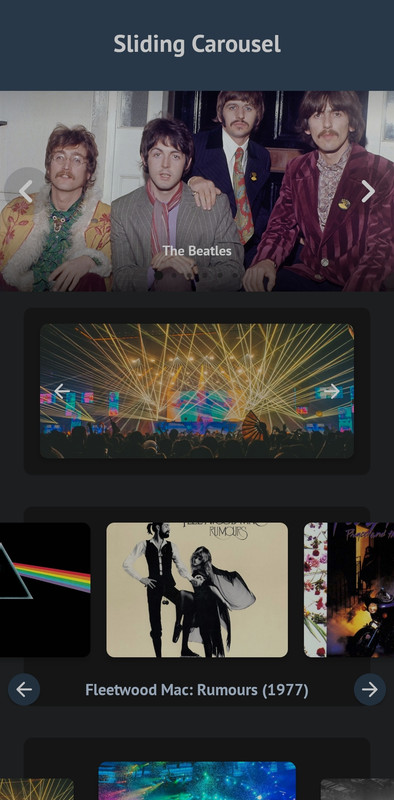Features • Development • Usage • License • Contribution
Slider is an Android library to add a beautiful image carousel to your app at ease.
- Written in Kotlin
- No boilerplate code
- Easy initialization
- Add the JitPack repository to your project's build.gradle file
allprojects {
repositories {
...
maven { url 'https://jitpack.io' }
}
}
- Add the dependency in your app's build.gradle file
dependencies {
implementation 'com.github.akshaaatt:Sliding-Carousel:1.0.4'
}
Add the view com.aemerse.slider.ImageCarousel in your layout:
<com.aemerse.slider.ImageCarousel
android:id="@+id/carousel"
android:layout_width="match_parent"
android:layout_height="256dp" />Use the CarouselItem class for data item. Initialize the ImageCarousel with data using setData() function:
// Kotlin
val carousel: ImageCarousel = findViewById(R.id.carousel)
// Register lifecycle. For activity this will be lifecycle/getLifecycle() and for fragment it will be viewLifecycleOwner/getViewLifecycleOwner().
carousel.registerLifecycle(lifecycle)
val list = mutableListOf<CarouselItem>()
// Image URL with caption
list.add(
CarouselItem(
imageUrl = "https://images.unsplash.com/photo-1532581291347-9c39cf10a73c?w=1080",
caption = "Photo by Aaron Wu on Unsplash"
)
)
// Just image URL
list.add(
CarouselItem(
imageUrl = "https://images.unsplash.com/photo-1534447677768-be436bb09401?w=1080"
)
)
// Image URL with header
val headers = mutableMapOf<String, String>()
headers["header_key"] = "header_value"
list.add(
CarouselItem(
imageUrl = "https://images.unsplash.com/photo-1534447677768-be436bb09401?w=1080",
headers = headers
)
)
// Image drawable with caption
list.add(
CarouselItem(
imageDrawable = R.drawable.image_1,
caption = "Photo by Kimiya Oveisi on Unsplash"
)
)
// Just image drawable
list.add(
CarouselItem(
imageDrawable = R.drawable.image_2
)
)
// ...
carousel.setData(list)That's all you need to use the library! :)
All the custom XML attributes for ImageCarousel view with default values are given below. All attributes are optional.
<com.aemerse.slider.ImageCarousel
android:id="@+id/carousel"
android:layout_width="match_parent"
android:layout_height="match_parent"
app:showTopShadow="true"
app:topShadowAlpha="0.6"
app:topShadowHeight="32dp"
app:showBottomShadow="true"
app:bottomShadowAlpha="0.6"
app:bottomShadowHeight="64dp"
app:showCaption="true"
app:captionMargin="0dp"
app:captionTextSize="14sp"
app:showIndicator="true"
app:indicatorMargin="0dp"
app:imageScaleType="centerCrop"
app:carouselBackground="#00000000"
app:imagePlaceholder="@drawable/ic_picture"
app:carouselPadding="0dp"
app:carouselPaddingBottom="0dp"
app:carouselPaddingEnd="0dp"
app:carouselPaddingStart="0dp"
app:carouselPaddingTop="0dp"
app:showNavigationButtons="true"
app:previousButtonLayout="@layout/previous_button_layout"
app:previousButtonId="@id/btn_previous"
app:previousButtonMargin="4dp"
app:nextButtonLayout="@layout/next_button_layout"
app:nextButtonId="@id/btn_next"
app:nextButtonMargin="4dp"
app:carouselType="BLOCK"
app:carouselGravity="CENTER"
app:scaleOnScroll="false"
app:scalingFactor="0.15"
app:autoWidthFixing="true"
app:autoPlay="false"
app:autoPlayDelay="3000"
app:infiniteCarousel="true"
app:touchToPause="true" />You can also set all the attributes programmatically. All the methods and their usages given below.
val carousel: ImageCarousel = findViewById(R.id.carousel)
// Attributes
carousel.carouselPadding = 0.dpToPx(context)
carousel.carouselPaddingStart = 0.dpToPx(context)
carousel.carouselPaddingTop = 0.dpToPx(context)
carousel.carouselPaddingEnd = 0.dpToPx(context)
carousel.carouselPaddingBottom = 0.dpToPx(context)
carousel.showTopShadow = true
carousel.topShadowAlpha = 0.6f // 0 to 1, 1 means 100%
carousel.topShadowHeight = 32.dpToPx(context) // px value of dp
carousel.showBottomShadow = true
carousel.bottomShadowAlpha = 0.6f // 0 to 1, 1 means 100%
carousel.bottomShadowHeight = 64.dpToPx(context) // px value of dp
carousel.showCaption = true
carousel.captionMargin = 0.dpToPx(context) // px value of dp
carousel.captionTextSize = 14.spToPx(context) // px value of sp
carousel.showIndicator = true
carousel.indicatorMargin = 0.dpToPx(context) // px value of dp
carousel.showNavigationButtons = true
carousel.imageScaleType = ImageView.ScaleType.CENTER_CROP
carousel.carouselBackground = ColorDrawable(Color.parseColor("#333333"))
carousel.imagePlaceholder = ContextCompat.getDrawable(
context,
R.drawable.ic_picture
)
// For custom previous or next button layout,
// set the layout using "previousButtonLayout" attribute and
// give the View/Button id in "previousButtonId" attribute.
carousel.previousButtonLayout = R.layout.previous_button_layout
carousel.previousButtonId = R.id.btn_previous
carousel.previousButtonMargin = 4.dpToPx(context) // px value of dp
carousel.nextButtonLayout = R.layout.next_button_layout
carousel.nextButtonId = R.id.btn_next
carousel.nextButtonMargin = 4.dpToPx(context) // px value of dp
carousel.carouselType = CarouselType.BLOCK
carousel.scaleOnScroll = false
carousel.scalingFactor = .15f // 0 to 1; 1 means 100
// If the width of a single item in ImageCarousel is not greater then
// half of the whole ImageCarousel view width, then the ImageCarousel
// will not work as expected, So it is recommended to set this value
// true all the time. So, the carousel will automatically increase the
// width of the items if necessary.
carousel.autoWidthFixing = true
// If you want auto slide, turn this feature on.
carousel.autoPlay = false
carousel.autoPlayDelay = 3000 // Milliseconds
// Touch to pause autoPlay.
carousel.touchToPause = true
// Infinite scroll for the carousel.
carousel.infiniteCarousel = true
// Scroll listener
carousel.onScrollListener = object : CarouselOnScrollListener {
override fun onScrollStateChanged(
recyclerView: RecyclerView,
newState: Int,
position: Int,
carouselItem: CarouselItem?
) {
// ...
}
override fun onScrolled(
recyclerView: RecyclerView,
dx: Int,
dy: Int,
position: Int,
carouselItem: CarouselItem?
) {
// ...
}
}
// Carousel listener
carousel.carouselListener = object : CarouselListener {
override fun onCreateViewHolder(
layoutInflater: LayoutInflater,
parent: ViewGroup
): ViewBinding? {
// ...
}
override fun onBindViewHolder(
binding: ViewBinding,
imageScaleType: ImageView.ScaleType,
item: CarouselItem,
position: Int
) {
// ...
}
override fun onClick(position: Int, carouselItem: CarouselItem) {
// ...
}
override fun onLongClick(position: Int, dataObject: CarouselItem) {
// ...
}
}
// Goto next slide/item
carousel.next()
// Goto previous slide/item
carousel.previous()
// Start auto play
carousel.start()
// Stop auto play
carousel.stop()
// If you need custom indicator, use the CircleIndicator2 from CircleIndicator (https://github.com/ongakuer/CircleIndicator).
// Then pass the view to the ImageCarousel.
val customIndicator: CircleIndicator2 = findViewById(R.id.custom_indicator)
carousel.setIndicator(customIndicator)
// For activity this will be lifecycle/getLifecycle() and for fragment it will be viewLifecycleOwner/getViewLifecycleOwner().
carousel.registerLifecycle(lifecycle)
// ...
// You can use the following methods to add CarouselItem data to the carousel:
// 1. setData(data: List<CarouselItem>): Set a list of CarouselItem. This will remove previous data from the carousel.
// 2. addData(data: List<CarouselItem>): Append list of CarouselItem with existing data.
// 3. addData(item: CarouselItem): Append a CarouselItem with existing data.
carousel.setData(list)You are most welcome to contribute to this project!




